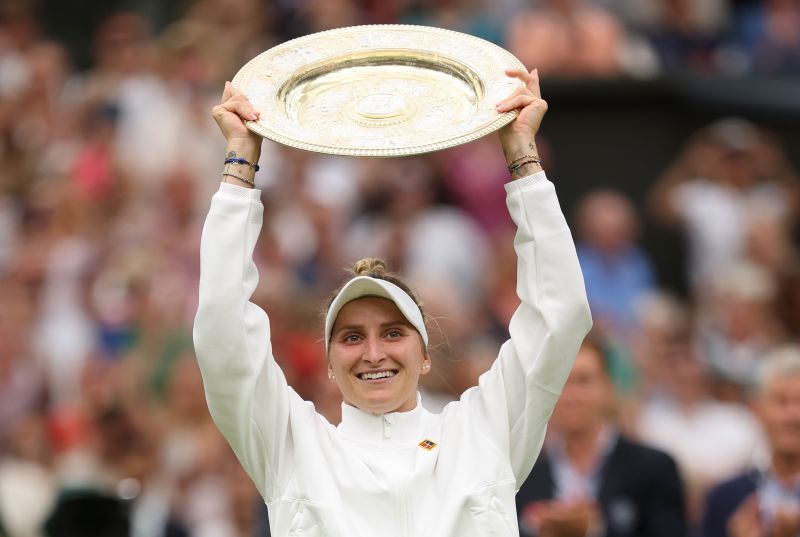Markéta Vondroušová had overcome the odds throughout the last fortnight at Wimbledon and the Czech did so again in the women’s final on Saturday, beating favorite Ons Jabeur to become the first unseeded woman in the Open Era to win the famous tournament.
The world No. 42, who was playing in her second grand slam final, beat the No. 6 seed 6-4 6-4 on Centre Court to make history, falling onto the grass as the enormity of her achievement hit her.
Not since Serena Williams in 2018, when the American was ranked 181 in the world, had a female player ranked so low in the world reached a Wimbledon final. The last unseeded woman to do so was Billie Jean King in 1963.
Last year Vondroušová was in London as a tourist, still recovering from surgery to her left wrist. And at the start of Wimbledon, seven months on from her most recent injury comeback, no one had expected her to be competing in the championship match, not even the player herself whose husband had remained in the Czech Republic until the final to look after their cat, Frankie.
But Jabeur became the fifth seeded player to fall to the 24-year-old in this tournament as her unpredictability proved difficult for her opponents to overcome, with the Tunisian particularly struggling despite having numerous opportunities to take control of the match.
“Tennis is crazy,” said Vondroušová, a former junior No. 1 and runner-up at the 2019 French Open, in her on-court interview. “Yeah, I really don’t know what is happening now, it’s an amazing feeling.”
History would have been made no matter which of the finalists had lifted the Venus Rosewater Dish, but the enormity of the occasion weighed heavier on Jabeur, who has now lost a second successive Wimbledon final with this, she said after the defeat, being the most painful of her career. This was also her third loss in a major final.
But that is what pressure does to a player, especially one carrying the hopes of not only a nation but a continent while also trying to grapple with her own expectations, dreams and past failures. Jabeur again came close to becoming the first Arab and African woman to win a grand slam, but her 31 unforced errors proved costly and the wait goes on. That she won just four of 10 break points will likely play heavy on her mind for some time, too.
“I’m not going to give up, I’m going to come back stronger,” she told Centre Court while also wiping away the tears.
Unpredictable and fearless
Jabeur had plenty of opportunities in the first set in particular, but secured only two of seven break points and made 17 unforced errors. Statistics she would come to regret as Vondroušová took control.
The finalists traded breaks in the second and third games of the match, drawing level at 2-2 after a series of absorbing, lengthy baseline battles. More breaks followed – four in the opening seven games – as nerves infiltrated their play, adding to the tension.
Vondroušová, the unpredictable left-handed underdog varied her tactics brilliantly. She kept changing the pace and spin on the ball and eventually took the first set, securing the crucial break in the ninth game to serve out the set.
The 28-year-old Jabeur was left shaking her head as she was broken in the opening game of the second set, her opponent rattling off six games in a row to put herself in the ascendancy.
The momentum shift was a surprise, but Vondroušová has unnerved opponents throughout these last two weeks. When it’s impossible to predict what shot will come next, seeds of doubts start to play with the mind.
But things can change quickly in tennis and just when Jabeur seemed to be dangling off the precipice, from 40-0 down on Vondroušová serve she broke back to level the match. Hope was restored, and a nation breathed a little easier. But only for a short while.
Jabeur was still unable to inflict the killer blow on a player who refused to yield and, crucially, Vondroušová broke back to make the most of her opponent’s nervousness, continuing the unpredictable nature of the match.
The crowd was rooting for Jabeur, the supremely talented Tunisian who had said it was her dream to win at the All England Club, but their vociferous support was not enough and, at 4-4, Vondroušová broke again and served for the match, a backhand volley securing a famous and deserved win.

